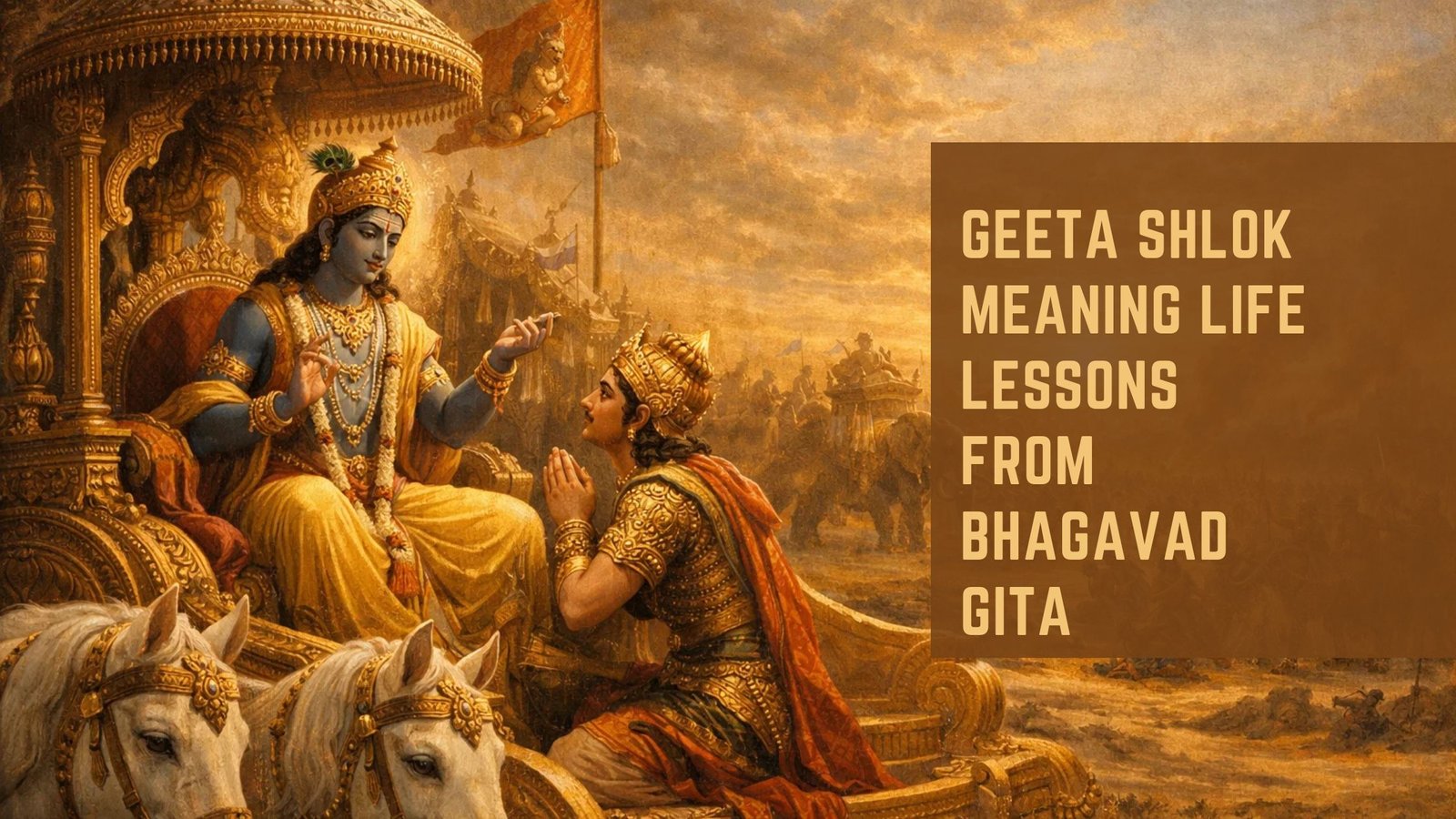The Bhagavad Gita, often referred to simply as the Gita, is a 700-verse Hindu scripture that is part of the Indian epic Mahabharata. It is a philosophical dialogue between Prince Arjuna and Lord Krishna, who serves as his charioteer. This sacred text is revered not only for its spiritual insights but also for its profound exploration of human dilemmas and ethical questions.
The Gita addresses the moral and philosophical struggles faced by individuals, particularly in the context of duty, righteousness, and the pursuit of a meaningful life. Its teachings transcend time and culture, offering wisdom that resonates with people across various backgrounds. The setting of the Gita is a battlefield, where Arjuna is torn between his duty as a warrior and his moral qualms about fighting against his own kin.
This poignant moment serves as a metaphor for the internal conflicts that individuals face in their lives. The dialogue unfolds as Krishna imparts wisdom to Arjuna, guiding him through his doubts and fears. The Gita encapsulates essential themes such as duty (dharma), righteousness, devotion, and the nature of reality, making it a cornerstone of Hindu philosophy and spirituality.
Its teachings have inspired countless individuals seeking clarity and purpose in their lives.
Key Takeaways
- The Bhagavad Gita is a sacred Hindu scripture that offers guidance on finding purpose and overcoming obstacles in life.
- Dharma, the concept of duty and righteousness, is a central theme in the Bhagavad Gita and emphasizes the importance of fulfilling one’s responsibilities.
- Finding purpose is significant as it provides direction, meaning, and fulfillment in life, according to the teachings of the Bhagavad Gita.
- Bhagavad Gita 3:21 emphasizes the importance of performing one’s duty without attachment to the results, focusing on selfless action.
- The teachings of the Bhagavad Gita can be applied to modern life by emphasizing the importance of selfless action, finding purpose, and overcoming obstacles.
- Through selfless action, individuals can find purpose and fulfillment, according to the Bhagavad Gita.
- Overcoming obstacles in the pursuit of purpose involves cultivating resilience, determination, and a positive mindset, as taught in the Bhagavad Gita.
- Embracing purpose through the teachings of the Bhagavad Gita can lead to a more meaningful and fulfilling life, according to its principles.
Understanding the concept of Dharma
Dharma is a central theme in the Bhagavad Gita, representing the moral law combined with spiritual discipline that guides an individual’s life. It encompasses duties, rights, laws, conduct, virtues, and the right way of living. In the context of the Gita, dharma is not merely about following societal norms; it is about understanding one’s true nature and fulfilling one’s responsibilities in alignment with that understanding.
Arjuna’s struggle with his dharma illustrates the complexities of adhering to one’s duty while grappling with personal emotions and ethical dilemmas. The Gita emphasizes that dharma is not a one-size-fits-all concept; it varies according to an individual’s circumstances, stage of life, and personal inclinations. Krishna advises Arjuna to embrace his warrior dharma, which involves fighting for justice and righteousness.
This guidance highlights that fulfilling one’s dharma often requires courage and self-awareness.
The Gita teaches that true fulfillment comes from aligning one’s actions with their dharma, leading to a harmonious existence.
Exploring the significance of finding purpose

Finding purpose is a fundamental aspect of human existence, and the Bhagavad Gita offers profound insights into this quest. Purpose provides individuals with direction and motivation, serving as a guiding light through life’s uncertainties. In the Gita, Krishna encourages Arjuna to look beyond immediate desires and fears, urging him to recognize the greater significance of his actions.
This perspective invites individuals to reflect on their own lives and consider how their choices contribute to a larger narrative. The search for purpose often involves introspection and self-discovery. The Gita teaches that understanding one’s true self is essential for identifying one’s purpose.
When individuals connect with their inner essence, they can align their actions with their values and aspirations. This alignment fosters a sense of fulfillment that transcends material success or societal approval. The teachings of the Gita remind individuals that purpose is not solely about personal achievement; it also encompasses contributing to the well-being of others and the world at large.
Analyzing Bhagavad Gita 3:21
| Verse | Meaning |
|---|---|
| 3:21 | Whatever action a great man performs, common men follow. And whatever standards he sets by exemplary acts, all the world pursues. |
In Bhagavad Gita 3:21, Krishna states, “Whatever action a man performs, he should do it according to his own dharma.” This verse encapsulates the essence of selfless action and responsibility. It emphasizes that individuals should act in accordance with their own duties while being mindful of their impact on others. The verse serves as a reminder that one’s actions should be guided by a sense of duty rather than personal gain or desire for recognition.
This teaching underscores the importance of integrity in one’s actions. When individuals perform their duties with sincerity and dedication, they contribute positively to society and inspire others to do the same. The Gita advocates for a life of purpose driven by selflessness rather than selfishness.
By focusing on fulfilling their dharma without attachment to outcomes, individuals can cultivate inner peace and harmony in their lives. This principle encourages individuals to rise above personal ambitions and work towards the greater good.
Applying the teachings of Bhagavad Gita to modern life
The teachings of the Bhagavad Gita are remarkably relevant in today’s fast-paced world, where individuals often grapple with stress, uncertainty, and existential questions. The Gita’s emphasis on self-awareness and mindfulness can guide individuals in navigating modern challenges. By encouraging introspection and reflection on one’s values and priorities, the Gita provides a framework for making conscious choices that align with one’s true self.
Incorporating the principles of dharma into daily life can lead to greater fulfillment and purpose. Individuals can start by identifying their unique strengths and responsibilities within their personal and professional spheres. By embracing their roles with dedication and integrity, they can contribute positively to their communities while fostering personal growth.
The Gita’s teachings encourage individuals to approach challenges with resilience and an open heart, reminding them that every experience is an opportunity for learning and growth.
Finding purpose through selfless action

Selfless action is a cornerstone of the Bhagavad Gita’s philosophy, emphasizing that true fulfillment arises from serving others without attachment to results. This principle encourages individuals to engage in acts of kindness and compassion as a means of discovering their purpose. When individuals shift their focus from self-centered desires to serving others, they often find deeper meaning in their lives.
The Gita teaches that selfless action leads to liberation from the cycle of desire and suffering. By acting without attachment to outcomes, individuals can experience a sense of freedom and joy that transcends material pursuits. This approach fosters a sense of interconnectedness with others, reinforcing the idea that one’s purpose is often intertwined with the well-being of those around them.
Through selfless action, individuals can cultivate empathy, compassion, and a profound sense of belonging within their communities.
Overcoming obstacles in the pursuit of purpose
The journey toward finding purpose is rarely straightforward; it often involves facing obstacles and challenges along the way. The Bhagavad Gita acknowledges these struggles as an integral part of life’s journey. Arjuna’s initial reluctance to engage in battle reflects the internal conflicts that many individuals encounter when pursuing their goals or fulfilling their responsibilities.
The teachings of Krishna provide valuable insights into overcoming these obstacles. One key lesson from the Gita is the importance of resilience in the face of adversity. Krishna encourages Arjuna to confront his fears and doubts head-on rather than shying away from them.
This message resonates with anyone facing challenges in their pursuit of purpose. By embracing difficulties as opportunities for growth, individuals can develop strength and determination that propel them forward on their path. The Gita teaches that perseverance, coupled with self-awareness and commitment to one’s dharma, can help individuals navigate obstacles with grace.
Embracing purpose through the teachings of Bhagavad Gita
In conclusion, the Bhagavad Gita offers timeless wisdom on finding purpose through understanding dharma, engaging in selfless action, and overcoming obstacles.
By embracing these principles, individuals can cultivate a sense of fulfillment that transcends material pursuits.
The relevance of the Gita’s teachings extends beyond religious or cultural boundaries; they resonate with anyone seeking clarity in an increasingly complex world. As individuals navigate their unique paths, they can draw inspiration from Arjuna’s journey and Krishna’s guidance. Ultimately, embracing purpose through the teachings of the Bhagavad Gita empowers individuals to lead lives marked by integrity, compassion, and meaningful contributions to society.
In a related article to Bhagavad Gita Chapter 3 Verse 21, “Unlocking the Bhagavad Gita’s Hidden Wisdom” delves into the deeper meanings and teachings of this sacred text. The article explores the significance of selfless action and the importance of performing one’s duties without attachment to the results. It sheds light on the timeless wisdom contained within the verses of the Bhagavad Gita, offering readers a deeper understanding of how to navigate life’s challenges with grace and wisdom. To read more about this insightful interpretation, visit here.
FAQs
What is the significance of Bhagavad Gita chapter 3 verse 21?
This verse emphasizes the importance of performing one’s duty without attachment to the results. It teaches the concept of selfless action and the idea that one should focus on performing their duties without being attached to the outcomes.
What is the context of Bhagavad Gita chapter 3 verse 21?
This verse is part of the teachings of Lord Krishna to Arjuna on the battlefield of Kurukshetra. In this chapter, Lord Krishna explains the concept of karma yoga, or the path of selfless action, to Arjuna.
How does Bhagavad Gita chapter 3 verse 21 relate to everyday life?
This verse teaches the importance of performing one’s duties diligently and without attachment to the results. It encourages individuals to focus on their actions and responsibilities without being overly concerned about the outcomes, which can be applied to various aspects of everyday life.
What are the key teachings of Bhagavad Gita chapter 3 verse 21?
The key teachings of this verse include the concept of selfless action, the importance of performing one’s duties, and the idea of detachment from the results of one’s actions. It emphasizes the need to focus on the present moment and the task at hand without being overly concerned about the future.














